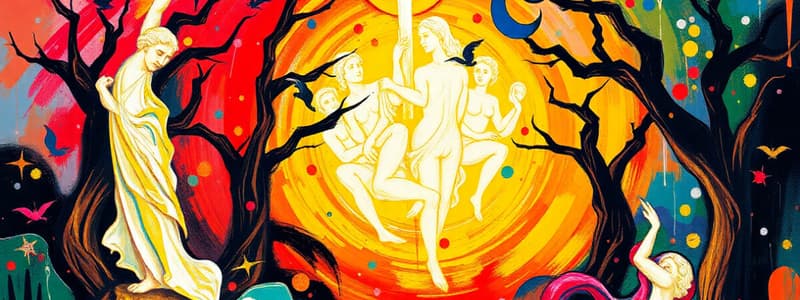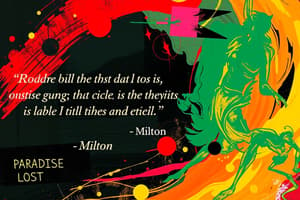Podcast
Questions and Answers
In Paradise Lost, how does Milton portray the immediate aftermath of Adam consuming the fruit?
In Paradise Lost, how does Milton portray the immediate aftermath of Adam consuming the fruit?
- Nature celebrates with vibrant colors and harmonious sounds.
- Nature withers and dies, signaling the immediate destruction of Eden.
- Nature remains undisturbed, showing no reaction to their act.
- Nature weeps through rain and thunderstorms, symbolizing the original sin. (correct)
How does Adam describe his feelings to Eve after eating the fruit in Paradise Lost?
How does Adam describe his feelings to Eve after eating the fruit in Paradise Lost?
- He reveals he feels 'inflamed' and full of lust, inviting her to 'play'. (correct)
- He expresses regret and remorse for his actions.
- He claims he feels enlightened and closer to God.
- He admits to feeling indifferent and unchanged.
Following Adam and Eve's transgression, what is their immediate emotional and psychological response, according to the text?
Following Adam and Eve's transgression, what is their immediate emotional and psychological response, according to the text?
- They are overwhelmed by shame and the realization of their trespass. (correct)
- They experience a sense of peace and fulfillment.
- They feel empowered and enlightened.
- They feel no different than before.
In Book IX, which earlier character is described as experiencing 'joy' similar to Eve's?
In Book IX, which earlier character is described as experiencing 'joy' similar to Eve's?
The text explores varying interpretations of Adam's motivations in the Fall. Which statement best describes one of these interpretations?
The text explores varying interpretations of Adam's motivations in the Fall. Which statement best describes one of these interpretations?
What is one of the immediate effects of the Fall on the earth itself?
What is one of the immediate effects of the Fall on the earth itself?
What does the text suggest is 'born' from the Fall, as indicated by the inverted word order emphasizing 'Original'?
What does the text suggest is 'born' from the Fall, as indicated by the inverted word order emphasizing 'Original'?
How are Adam and Eve described immediately after eating the fruit?
How are Adam and Eve described immediately after eating the fruit?
What is the significance of gustatory imagery in Milton's portrayal of Adam's transformation in lines 1017-1033?
What is the significance of gustatory imagery in Milton's portrayal of Adam's transformation in lines 1017-1033?
What does Adam's flawed reasoning, expressing that forbidden pleasure 'might be wished', suggest about his state of mind?
What does Adam's flawed reasoning, expressing that forbidden pleasure 'might be wished', suggest about his state of mind?
How does the text contrast Adam and Eve's postlapsarian state with their prelapsarian state in Book IX?
How does the text contrast Adam and Eve's postlapsarian state with their prelapsarian state in Book IX?
How does Milton depict the differences between pre- and postlapsarian intimacy between Adam and Eve?
How does Milton depict the differences between pre- and postlapsarian intimacy between Adam and Eve?
What is the symbolic significance of the 'hyacinth[s]' appearing in both the pre- and postlapsarian sex scenes?
What is the symbolic significance of the 'hyacinth[s]' appearing in both the pre- and postlapsarian sex scenes?
What is the significance of the alliterative link between 'solace' and 'sin'?
What is the significance of the alliterative link between 'solace' and 'sin'?
How does the olfactory imagery used to describe pre- and postlapsarian sex differ?
How does the olfactory imagery used to describe pre- and postlapsarian sex differ?
According to lines 1046-1066, which of the following is presented as a virtue lost by Adam and Eve due to the Fall?
According to lines 1046-1066, which of the following is presented as a virtue lost by Adam and Eve due to the Fall?
What ability have Adam and Eve lost because of eating the fruit?
What ability have Adam and Eve lost because of eating the fruit?
What 'fallen virtues' will Adam and Eve have to learn?
What 'fallen virtues' will Adam and Eve have to learn?
What does the text suggest about Adam and Eve's situation after the Fall?
What does the text suggest about Adam and Eve's situation after the Fall?
The phrase 'Carnal desire inflaming' is an example of what?
The phrase 'Carnal desire inflaming' is an example of what?
Flashcards
Adam and Eve's Fall
Adam and Eve's Fall
Adam is overcome by Eve's 'female charm' and eats the forbidden fruit. Nature weeps, and they experience 'carnal desire'.
Adam's Post-Fruit Reaction
Adam's Post-Fruit Reaction
Adam expresses gratitude to Eve for introducing him to the pleasure and admits he is 'inflamed' with lust, inviting her to 'play'.
Realization of Trespass
Realization of Trespass
After indulging in 'amorous play', they awaken from a restless sleep, realizing the extent of their sin. Their innocence is lost, and they are overwhelmed with shame.
Nature's Reaction to the Fall
Nature's Reaction to the Fall
Signup and view all the flashcards
Milton's Metaphors
Milton's Metaphors
Signup and view all the flashcards
Adam's Reasoning
Adam's Reasoning
Signup and view all the flashcards
Postlapsarian Sex
Postlapsarian Sex
Signup and view all the flashcards
Lost Virtues
Lost Virtues
Signup and view all the flashcards
New Virtues
New Virtues
Signup and view all the flashcards
Study Notes
- These notes cover Paradise Lost, lines 990-1066
Plot Summary (Lines 990-1066)
- Adam and Eve embrace, and Adam eats the fruit after initially resisting, succumbing to "female charm."
- Rain and thunderstorms begin as a symbolic weeping of Nature due to the original sin.
- The pair become intoxicated and experience their first "carnal desire."
- Adam expresses gratitude to Eve for introducing him to the pleasure from the forbidden fruit.
- He admits to being 'inflamed' and full of lust, inviting Eve to 'play' with him, suggesting a sinful sexual awakening.
- Eve signals her consent, and they disappear into the thicket for 'amorous play'.
- They fall asleep, wake up disturbed by 'unkindly fumes', and realize the extent of their transgression.
- They experience the loss of innocence and are overwhelmed by shame.
Analysis of the Fall
- Evidence suggests Adam acted foolishly, overcome by ‘female charm' without thinking.
- Adam's fall is more significant as it seals the fate of humankind.
- Adam was not ‘deceived' but rather allowed his love and passions for Eve to ‘charm’ his reason.
- Love is portrayed as the cause of the Fall and the greatest temptation.
- It is possible to consider Adam a heroic figure, especially given the future sacrifice of Jesus out of love for humankind.
Effects of the Fall
- The earth groans, and the sky darkens, accompanied by thunder ("muttered") and weeping rain.
- Personification create a powerful sense of pathos.
- Lines suggest the birth of mortal ‘Sin / Original' from the Fall.
- The inverted word order emphasizes the significance of 'Original'.
- They appear drunk, aligning with contemporary beliefs about the immediate effects of the Fall.
- Contemporary belief was that ‘new wine' was stronger than older wine.
- "They swim in mirth" evokes sensual pleasure and slow, labored movements.
- "Breeding wings" suggests a growing sense of importance and aspiration.
- Lust presented as intense and dangerous, mirroring the earlier comparison between Satan and a will o' the wisp.
- Eyes are used to show characters as beguiled, like Adam when Eve departs, Satan's, and Eve's when tempted.
- Description of Adam's 'lascivious eyes' carries extra weight.
- The frequency of sexual imagery highlights how overwhelming lust is for both: 'carnal desire inflaming'; ‘lascivious eyes'; 'wantonly repaid'; 'in lust they burn'; ‘dalliance move’.
- Gustatory imagery conveys Adam's powerful appetite, implying he wants to devour Eve like a fruit.
- The etymological root of 'sapience' (sapere - to taste in Latin) links physical and intellectual appetite taught by Satan.
- Adam's reasoning suggests the act of transgressing causes his changed state of mind rather than any chemical aspect of the fruit.
- Adam's flawed thinking suggests that there is something "thrilling" about sinful thoughts and actions.
- Adam hinting at the Ten Commandments that ‘it might be wished. / For this one Tree had been forbidden ten.'
Contrasting States
- Postlapsarian lack of control contrasts with earlier restraint.
- Postlapsarian speech is frantic, opposite to the calm and measured one earlier in Book IX.
- Their speech vs Adam's ‘mild answer' and 'healing words', and Eve's 'accent sweet'.
- Their gardening initially shows control over the garden: 'what we by day / Lop overgrown...Tending to the wild.'
- The implication is that they have become as ‘wanton' and 'wild' as the vegetation.
Comparison of Sex Scenes
- Postlapsarian actions are hurried like Eve's eyes ‘darted', and her hand is 'seized' by Adam.
- Prelapsarian actions are eased and slow where they ‘eased' off their ‘disguises' and ‘side by side were laid.'
- Flowers appear in both scenes, but the postlapsarian bower has different flowers.
- Different flowers include ‘pansies, and violets, and asphodel', none of which appear in the prelapsarian bower.
- 'Hyacinth[s]' appear in both scenes and can be read a CLASSICAL ALLUSION.
- Alliterative link between solace and sin establishes a connection between comfort and sinful behaviour.
- Postlapsarian sex description is sensual, containing Olfactory imagery.
- The 'unkindly fumes contrast with the ‘sweet-smelling herbs'.
- The metaphor suggests sweaty bodies (‘dewy sleep') and primal behavior.
Changes Imposed
- Eating the fruit robbed them of their God-given ability to enable Reason to rule their passions and appetites.
- They lose the virtues of 'innocence', 'just confidence', 'native righteousness', and 'honour'.
- Instead, they must learn new ‘fallen virtues', such as penitence, forgiveness, and mutual supportiveness to reflect the human experience.
Studying That Suits You
Use AI to generate personalized quizzes and flashcards to suit your learning preferences.




